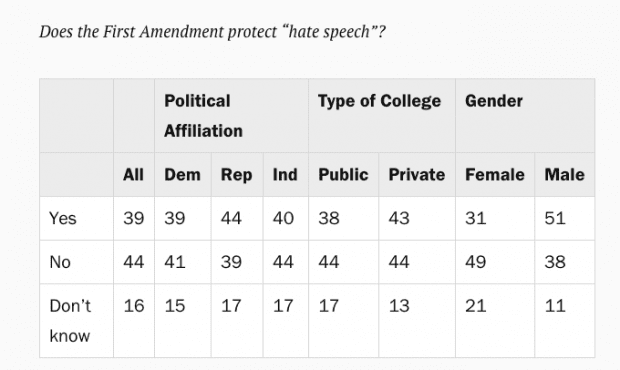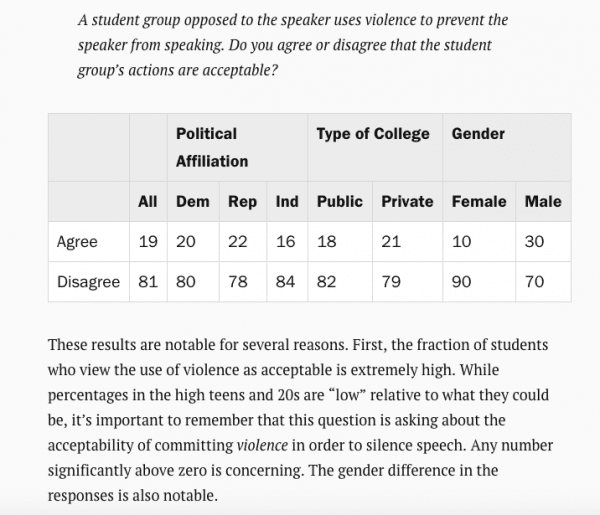Anti-First Amendment Culture Emerges

I’m fairly confident that most American religious conservatives — Christian ones, anyway — still have no idea what is coming our way. Did you see the results from the new Brookings survey of college students and the First Amendment? Before I give you the results, here, from the introduction, is why we should all care, even if we’re not in college:
[W]hat happens on campuses often foreshadows broader societal trends. Today’s college students are tomorrow’s attorneys, teachers, professors, policymakers, legislators, and judges. If, for example, a large fraction of college students believe, however incorrectly, that offensive speech is unprotected by the First Amendment, that view will inform the decisions they make as they move into positions of increasing authority later in their careers.
To underscore that point, remember that the First Amendment, like the rest of the Constitution, only means what judges say it means. The First Amendment was not believed to protect pornography, until the US Supreme Court said it did.
Brookings found that “freedom of expression is deeply imperiled on U.S. campuses” — and not just elite colleges and boutique liberal arts schools, either. Take a look at a couple of excerpts from the report:


Also, please note the high numbers of Republican students who agree with anti-First Amendment views. Slightly more Republican students believe violence is acceptable to shut down speech than Democrats! And not too many more GOP students believe the First Amendment protects hate speech than Democratic or Independent students.
The Brookings survey did not go beyond “hate speech” and the First Amendment, but it doesn’t require wild-eyed speculation to imagine what these students think about the First Amendment’s guarantees of religious liberty — especially when the religion in question is deemed “hateful” by them.
Take a look at this new ruling out of Minnesota:
A federal judge has dismissed a Minnesota couple’s lawsuit challenging a state law for the right to refuse to shoot wedding videos for same-sex couples.
Chief U.S. District Judge John Tunheim in Minneapolis dismissed Carl and Angel Larsen’s case Wednesday.
The St. Cloud couple, who own a videography company, Telescope Media Group, sued over a provision of the Minnesota Human Rights Act that bars discrimination by businesses, the Star Tribune reported. They argued that the law amounted to “a state effort to stamp out expression opposing same-sex marriage,” and they sought to post a notice on their company’s website that they won’t shoot same-sex weddings, based on their religious beliefs.
In his ruling, Tunheim described that as “conduct akin to a ‘White Applicants Only’ sign” that may be outlawed without infringing on First Amendment rights.
This case is a lot like the Colorado wedding cake maker’s case that will be heard this term by the US Supreme Court, so it’s possible that the SCOTUS ruling will land on the side of religious liberty. We’ll see. The broader point here is that we have a federal judge declaring, in effect, that religious belief privileging traditional marriage is tantamount to hate. You don’t need a weatherman to know which way the wind blows for religious conservatives in this country.
Let me be clear: the judge, in his ruling, said that the couple could publicly state their opposition to same-sex marriage on their website, as long as they did not turn away gay couples seeking their professional services. This is not a question of speech, strictly speaking, but of expressive conduct. The bottom line is that if you want to go into the wedding videography business in this jurisdiction, you had better be prepared to shoot gay weddings — or find another line of work. As I write in The Benedict Option:
Plus, companies that don’t abide by state and federal antidiscrimination statutes covering LGBTs will be not be able to receive government contracts. In fact, according to one religious liberty litigator who has had to defend clients against an exasperating array of antidiscrimination lawsuits, the only thing standing between an employer or employee and a court action is the imagination of LGBT plaintiffs and their lawyers.
“We are all vulnerable to such targeting,” he said.
Says a religious liberty lawyer, “There is no looming resolution to these conflicts; no plateau that we’re about to reach. Only intensification. It’s a train that won’t stop so long as there is momentum and track.”
David Gushee, a well-known Evangelical ethicist who holds an aggressively progressive stance on gay issues, published a column in 2016 noting that the middle ground is fast disappearing on the question of whether discrimination against gays and lesbians for religious reasons should be tolerated.
“Neutrality is not an option,” he wrote. “Neither is polite half-acceptance. Nor is avoiding the subject. Hide as you might, the issue will come and find you.”
Public school teachers, college professors, doctors, and lawyers will all face tremendous pressure to capitulate
to this ideology as a condition of employment. So will psychologists, social workers, and all in the helping professions; and of course, florists, photographers, backers, and all businesses that are subject to public accommodation laws.
Christian students and their parents must take this into careful consideration when deciding on a field of study in college and professional school. A nationally prominent physician who is also a devout Christian tells me he discourages his children from following in his footsteps. Doctors now and in the near future will be dealing with issues related to sex, sexuality, and gender identity but also to abortion and euthanasia. “Patient autonomy” and nondiscrimination are the principles that trump all conscience considerations, and physicians are expected to fall in line.
“If they make compliance a matter of licensure, there will be nowhere to hide,” said this physician. “And then what do you do if you’re three hundred thousand dollars in debt from medical school, and have a family with three kids and a sick parent? Tough call, because there aren’t too many parishes or church communities who would jump in and help.”
This is coming, and coming fast and hard. What does this have to do with the First Amendment attitudes of college students? Simply this: that in the future, those designated as “haters” will face significant discrimination, marginalization — and perhaps even violence by the rising intolerance of a generation raised on a sham ideology of diversity.
Re-read the piece I did about “Professor Kingsfield” in the immediate aftermath of the Indiana RFRA debacle (which occurred just before the Obergefell ruling in 2015). Excerpt:
What prompted his reaching out to me? “I’m very worried,” he said, of events of the last week. “The constituency for religious liberty just isn’t there anymore.”
Like me, what unnerved Prof. Kingsfield is not so much the details of the Indiana law, but the way the overculture treated the law. “When a perfectly decent, pro-gay marriage religious liberty scholar like Doug Laycock, who is one of the best in the country — when what he says is distorted, you know how crazy it is.”
“Alasdair Macintyre is right,” he said. “It’s like a nuclear bomb went off, but in slow motion.” What he meant by this is that our culture has lost the ability to reason together, because too many of us want and believe radically incompatible things.
But only one side has the power. When I asked Kingsfield what most people outside elite legal and academic circles don’t understand about the way elites think, he said “there’s this radical incomprehension of religion.”
“They think religion is all about being happy-clappy and nice, or should be, so they don’t see any legitimate grounds for the clash,” he said. “They make so many errors, but they don’t want to listen.”
To elites in his circles, Kingsfield continued, “at best religion is something consenting adult should do behind closed doors. They don’t really understand that there’s a link between Sister Helen Prejean’s faith and the work she does on the death penalty. There’s a lot of looking down on flyover country, one middle America.
“The sad thing,” he said, “is that the old ways of aspiring to truth, seeing all knowledge as part of learning about the nature of reality, they don’t hold. It’s all about power. They’ve got cultural power, and think they should use it for good, but their idea of good is not anchored in anything. They’ve got a lot of power in courts and in politics and in education. Their job is to challenge people to think critically, but thinking critically means thinking like them. They really do think that they know so much more than anybody did before, and there is no point in listening to anybody else, because they have all the answers, and believe that they are good.”
On the conservative side, said Kingsfield, Republican politicians are abysmal at making a public case for why religious liberty is fundamental to American life.
“The fact that Mike Pence can’t articulate it, and Asa Hutchinson doesn’t care and can’t articulate it, is shocking,” Kingsfield said. “Huckabee gets it and Santorum gets it, but they’re marginal figures. Why can’t Republicans articulate this? We don’t have anybody who gets it and who can unite us. Barring that, the craven business community will drag the Republican Party along wherever the culture is leading, and lawyers, academics, and media will cheer because they can’t imagine that they might be wrong about any of it.”
And there’s this. A reader I met recently in Nashville sent me a reference to the late René Girard’s book I See Satan Fall Like Lightning (the title is a reference to Jesus Christ’s words in Luke 10:18). Girard, as you may know, was one of the great geniuses of our time. Pascal-Emanuel Gobry’s remembrance of Girard upon his 2015 death is a good introduction to his thought, the most important aspect of which is Girard’s stunning insights into the social, religious, and anthropological origins of violence.
In his Satan book, Girard discusses victimization and scapegoating. He writes:
The victims most interesting to us are always those who allow us to condemn our neighbors. And our neighbors do the same. They always think first about victims for whom they hold us responsible.
This will ring distressingly true to those who see any discussion of subtlety, paradox, or complexity in public debate about sexuality, gender identity, religion and rights shouted down as aiding and abetting suicide, violence, and so forth. It’s very easy to conclude that some of the most ardent defenders of LGBT folks (or other favored minorities) undertake their crusades as much to punish those they despise as to defend the defenseless.
Girard goes on to say that “the most effective power of transformation is not revolutionary violence but the modern concern for victims.” Here’s where it gets intense:
The attempt by Nietzsche and Hitler to make humankind forget the concern for victims [taught uniquely by the Bible] has ended in a failure that seems definitive, at least for the moment. But it is not Christianity that profits from the victory of the concern for victims in our world. It is rather what I think must be called the other totalitarianism, the most cunning and malicious of the two, the one with the greatest future, by all evidence. At present it does not oppose Judeo-Christian aspirations but claims them as its own and questions the concern for victims on the part of Christians (not without a certain semblance of reason at the level of concrete action, given the deficiencies of historical Christianity). The other totalitarianism does not openly oppose Christianity but outflanks it on its left wing.
… The most powerful anti-Christian movement is the one that takes over and “radicalizes” the concern for victims in order to paganize it. The powers and principalities want to be “revolutionary” now, and they reproach Christianity for not defending victims with enough ardor. In Christian history they see nothing but persecutions, acts of oppression, inquisitions.
The other totalitarianism presents itself as the liberator of humanity. In trying to usurp the place of Christ, the powers imitate him in the way a mimetic rival imitates his model in order to defeat him. They denounce the Christian concern for victims as hypocritical and a pale imitation of the authentic crusade against oppression and persecution for which they would carry the banner themselves.
In the symbolic language of the New Testament, we would say that in our world Satan [whose name means “Accuser” — RD], trying to make a new start and gain new triumphs, borrows the language of victims. Satan imitates Christ better and better and pretends to surpass him. This imitation by the usurper has long been present in the Christianized world, but it has increased enormously in our time. The New Testament evokes this process in the language of the Antichrist. To understand this title, we should de-dramatize it, for it expresses something banal and prosaic.
The Antichrist boasts of bringing to human beings the peace and tolerance that Christianity promised by has failed to deliver. Actually, what the radicalization of contemporary victimology produces is a return to all sorts of pagan practices: abortion, euthanasia, sexual undifferentiation, Roman circus games galore but without real victims, etc.
Neo-paganism would like to turn the Ten Commandments and all of Judeo-Christian morality into some alleged intolerable violence, and indeed its primary objective is their complete abolition. Faithful observance of the moral law is perceived as complicity with the forces of persecution that are essentially religious.
Girard said that in our day, Christianity is “the indispensable scapegoat.” The forces now beginning to manifest in society have been building for a long time. They will have their day, making scapegoats — and perhaps one day martyrs — of believing orthodox Christians, all for the sake of avenging the victims for whom they hold Christian responsible.
In a culture coming to despise the First Amendment as a license to hate, attacks on religious institutions and religious people are going to intensify in the near future. If you’re not preparing for this, you’re illiterate at reading the signs of the times.
UPDATE: Reader Divinicus writes:
I know I’ve said this 100 times, but here is 101.
American Christians need to study the 17th-19th century Penal Laws in the United Kingdom. Their purpose was to politically and socially marginalize Catholics, and they succeeded swimmingly.
Many of the Penal Laws were things which could never pass constitutional muster in the United States today (e.g. religious tests for public office, bearing arms, and serving in the military). But many are hauntingly similar to efforts and successes of the American cultural left today to socially proscribe conservative religious belief and practice, such as:
– exclusion from the legal professions and the judiciary;
– exclusion from elite colleges and universities;
– exclusion from teaching children; and
– ban on the custody of orphans.The status of Catholics and the Catholic Church in Third Republic France is another good example for American Christians to study, particularly the left’s successes in eliminating Catholics from the educational system at every level.
Those who do not learn history are doomed to repeat it.